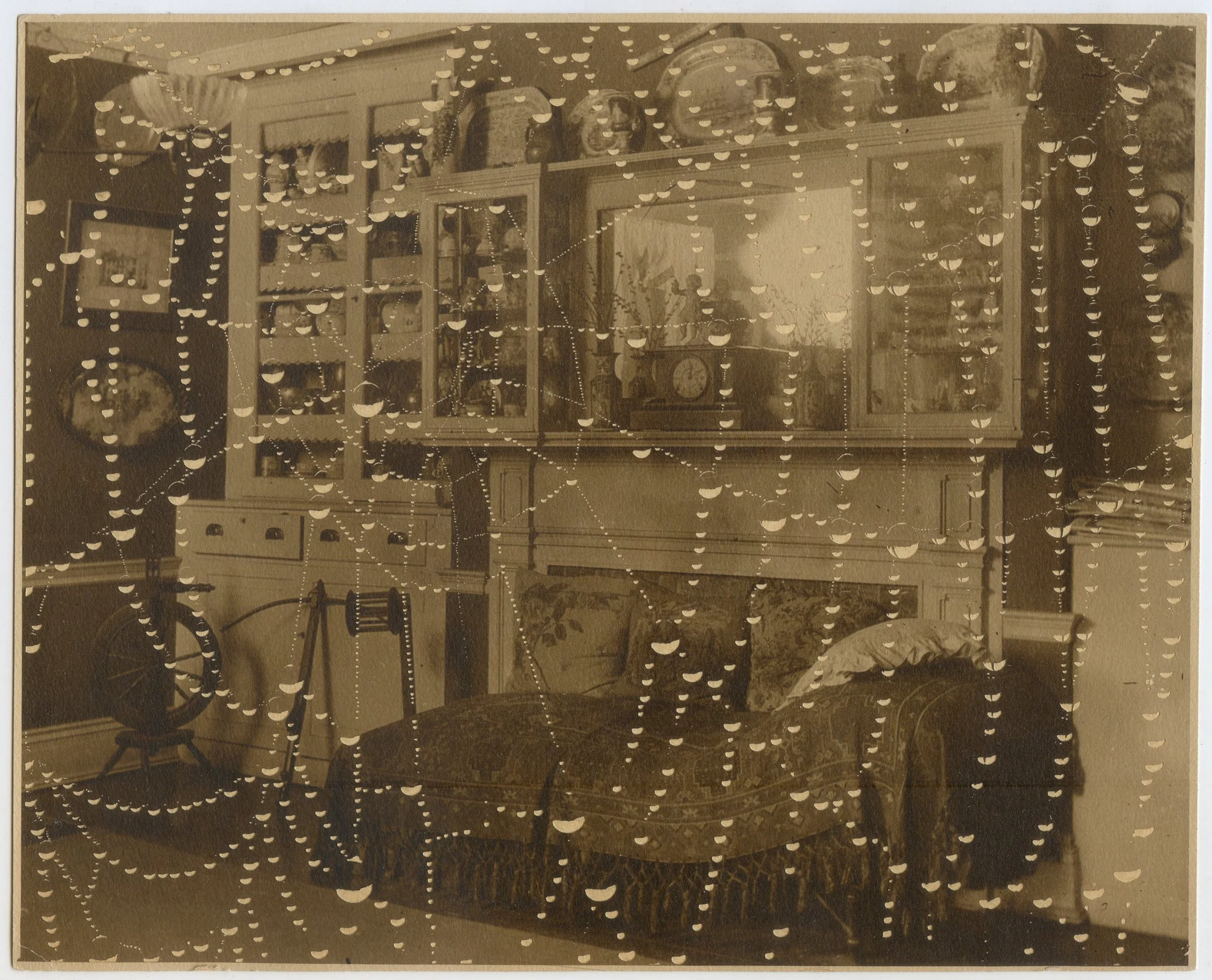Dinner Preparation
By Ranudi Gunawardena
Dinner Preparation
Before it ends, it begins. Malli returns
home, gasping with the news. We gather
in the kitchen against the silence of amma’s
hiramanaya, where father makes him repeat
with a slap on his back. After laughing
in disbelief, he follows malli out the door.
Shaking her head, amma resumes scraping
her coconut. Under her hands, its shredded
flesh falls like fine sand. Outside, the shore
stretches itself into the sea. Joining malli
and father, I stand in the sand, watch
the waters recede, leave behind reefs full of fish
flipping at our feet. As father walks over
to the men claiming the new shores, we run
home, return with wicker baskets and mother.
Squatting in the sun, we pick the fish
for the night’s dinner, their underbellies
glistening silver and delicious in our hands—
Rina Banerjee, A new citizen of a new family, a new comer, like immigrant farmer, a stolen child or a adopted love she enters her grooms world as welcomed guest or hungry pest, (2020). Acrylic and collage on paper, 79.5 × 59 cm. Courtesy of Ota Fine Arts.
Image description: Stylized surreal feminine figures in shades of lavendar and peach with yellow highlights set against a patterned background in greys, black, and white.
wombful of weeds
that year the mango tree
in our backyard blossomed
flowers
clustering at the ends of its branches
like the intricate lacework
on the pallu of a wedding osari
under the tree the garden-men
gathered red-brown with dirt
the square-blades of their mamoties rose and fell
as they dug
the pit when the blossoms fell
spinning starlike
from the sky
they lined it wilting
*
rain collected in
the pit parenting
a small patch of weeds springing
from the dark they trembled
in the sun with the eagerness of children
who know only one kind of hunger
we hunted then for frogs
over the yellowing grass we ran
past the rakes shovels and hoes
of the garden-men in our outstretched arms
the hollow hemispheres of coconut shells
were kitchen-borrowed traps
evenings we waited our legs dangling
into the pit—
now the honeymoon
place of frogs enchanting
mossy with rain
*
in the kitchen window two iron rails
converged in a cross
rusting they split
the backyard into four each morning
lifting the tea we inhaled
the cardamom the sliced ginger drowning in
condensed milk
in a rectangle of yard
our mother crouched her fingers
buried in wet soil
before her the vine crawled slithering
around her forearms
we watched it swell full
of fruit as her belly budded
into the round weight of watermelon
stretchmarks
climbing
the ripening flesh
*
opening their flowers to the sun
katarolu vines smothered the barbed wire fence
creeping defensively
around the garden
from the branches of the mango tree
kingfishers flitted
into the pit— its possibility
of pond their katarolu-stained wings
spread like folding fans
on the pit’s water surface
their bellies exposed crimson
when they emerged from the ripples
tadpoles
wriggled blue-black
between their beaks
*
evenings i watched you disappear
over the fence
claimed by boyhood
you were heavy with glorious light
treacherous vanishing
into the neighbor’s yard
the shapes on your sarong
burned windows
into the night
i was watcher then
important or made to believe so
listening for the car when my voice
lifted in signs of warning
to reach you in the tree top
you darted into the house
hopping the fence
i followed
you
even then
*
we knelt outside our ears pressed
against the wooden kitchen door
pooling in the window light
clashed in forceful waves
glassy color-contained
refusing to break
father stormed throwing the door open
his sarong wrinkled liquid-streaked
hitched up in his fist on
the kitchen floor her body
was limp her hair running
strandful—
a restless river
along the side of her pale forehead
*
taking their tools the garden-men
left their bare feet reluctant
upon the new unrolled grass
the mango tree shed
its flowers they fell a white rain
under the tree
father’s shadow stretched
distorted displeased
in the sun
in his hands the shovel labored
the earth falling
back
into the pit the kingfishers
soared
across the yard
frightened
Rina Banerjee, Groundlessness made them different caught them out in the open, boundless and against instinctual suspicion they knew now of unequalness like twine this arrested, dropped some disguise, allusions moistened reversed her garden of alienation, (2013). Acrylic, ink, water color paper, 101.7 x 151.8 cm. Courtesy of Ota Fine Arts.
Image description: Small, variously brown, mythical feminine figures floating against a yellow and white ground under upside-down tree branches the color of burnt siena and bright yellow leaves.
Ranudi Gunawardena is a Sri Lankan poet whose work explores the wombscape, childhood in rural landscapes, and the uncanny in nature, among others. Her work has appeared in literary magazines such as Action, Spectacle; Chestnut Review; Magma; and Shō. She studies at Williams College.
*
The work of Rina Banerjee (b. Kolkata, India) focuses on ethnicity, race, migration, and diasporic histories while drawing on her background and personal experience as an immigrant. Her sculptures feature textiles and domestic objects that reference colonial histories, while her drawings are inspired by Indian miniatures, Chinese silk paintings, and Aztec imagery. Banerjee’s work has been included in the 57th Venice Biennial, the Yokohama Triennale, and the Kochi Biennial and is held in numerous private and public collections, notably the Foundation Louis Vuitton, Whitney Museum of American Art, San Francisco Museum of Modern Art, Centre Pompidou, Pennsylvania Academy of Fine Arts, San Jose Museum of Art, Kiran Nadar Museum of Art, and the Brooklyn Museum of Art. Banerjee is represented by Perrotin Gallery, NY and OTA Fine Art, Singapore. She lives and works in Queens, NY.





“Like the man who wears a vest saying negotiator in a hostage situation, I want one that says prioritizer.” Three poems by Satya Dash.